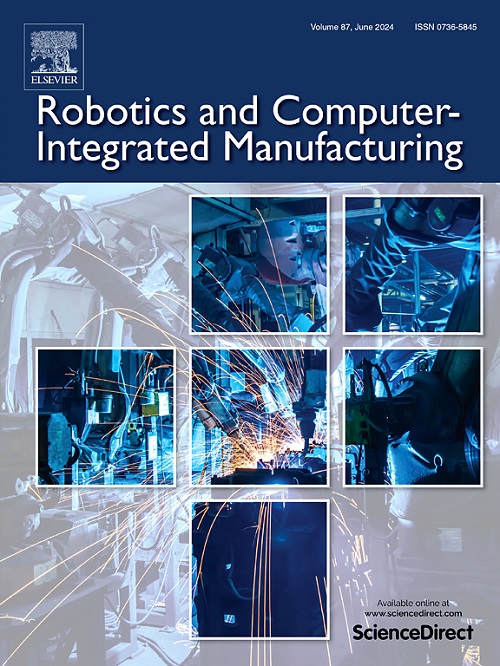考虑夹具短缺的定制制造系统柔性作业车间调度问题的析取图元启发式算法
IF 11.4
1区 计算机科学
Q1 COMPUTER SCIENCE, INTERDISCIPLINARY APPLICATIONS
引用次数: 0
摘要
定制制造系统代表了一种有前途的生产模式,能够生产各种产品以满足不同的客户需求。然而,有限的资源和复杂的过程使生产调度和资源分配的优化变得复杂。特别是在高度定制的制造企业中,夹具短缺经常出现,因为多个新作业可能同时需要相同的夹具。因此,某些夹具必须作为车间生产任务的一部分进行加工。针对考虑现场加工夹具的柔性作业车间调度问题,提出了一种改进的基于析取图的局部搜索遗传算法,以获得高质量的调度解。首先,引入了一些针对特定问题的遗传算子,以提高探测能力。其次,建立了总加权延迟的析取图来识别关键路径。第三,提出了一种基于关键路径的局部搜索方法,结合三种基于知识的邻域结构来提高搜索能力。最后,在20个实例中对该算法进行了评估,并与五种最先进的算法进行了比较。实验结果表明,该算法在收敛性和统计度量方面明显优于竞争对手。以某企业的日常订单为例,对该算法的实际效益进行了评价。通过实例分析,与原调度方案相比,总加权延迟率和最大完工时间分别降低了62.71%和42.13%。本文章由计算机程序翻译,如有差异,请以英文原文为准。
A disjunctive graph-based metaheuristic for flexible job-shop scheduling problems considering fixture shortages in customized manufacturing systems
Customized manufacturing systems represent a promising production paradigm capable of producing a variety of products to meet diverse customer needs. However, limited resources and complex processes complicate the optimization of production scheduling and resource allocation. In particular, fixture shortages frequently arise in a highly customized manufacturing enterprise, as multiple new jobs may require the same fixture simultaneously. Consequently, certain fixtures must be machined as part of production tasks in workshops. To derive high-quality scheduling solutions, this paper proposes an improved genetic algorithm with a disjunctive graph-based local search for flexible job-shop scheduling problems considering on-site machining fixtures. First, several problem-specific genetic operators are introduced to enhance exploration capabilities. Second, a disjunctive graph for total weighted tardiness is established to identify critical paths. Third, a critical path-based local search method is proposed, incorporating three knowledge-based neighborhood structures to improve exploitation capabilities. Finally, the proposed algorithm is evaluated in 20 instances and compared against five state-of-the-art algorithms. The experimental results demonstrate that the proposed algorithm significantly outperforms its competitors regarding convergence and statistical metrics. A daily order from the enterprise is examined as a case study to evaluate the practical benefits of the proposed algorithm. From this case study, the total weighted tardiness and makespan are reduced by 62.71% and 42.13%, respectively, compared to the original scheduling solution.
求助全文
通过发布文献求助,成功后即可免费获取论文全文。
去求助
来源期刊
CiteScore
24.10
自引率
13.50%
发文量
160
审稿时长
50 days
期刊介绍:
The journal, Robotics and Computer-Integrated Manufacturing, focuses on sharing research applications that contribute to the development of new or enhanced robotics, manufacturing technologies, and innovative manufacturing strategies that are relevant to industry. Papers that combine theory and experimental validation are preferred, while review papers on current robotics and manufacturing issues are also considered. However, papers on traditional machining processes, modeling and simulation, supply chain management, and resource optimization are generally not within the scope of the journal, as there are more appropriate journals for these topics. Similarly, papers that are overly theoretical or mathematical will be directed to other suitable journals. The journal welcomes original papers in areas such as industrial robotics, human-robot collaboration in manufacturing, cloud-based manufacturing, cyber-physical production systems, big data analytics in manufacturing, smart mechatronics, machine learning, adaptive and sustainable manufacturing, and other fields involving unique manufacturing technologies.

 求助内容:
求助内容: 应助结果提醒方式:
应助结果提醒方式:


